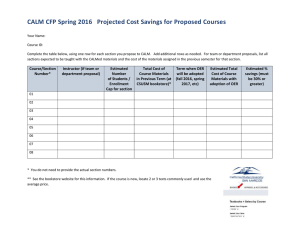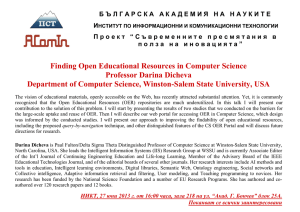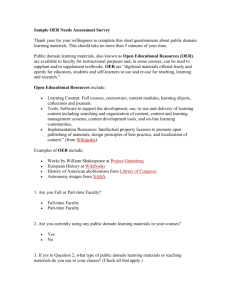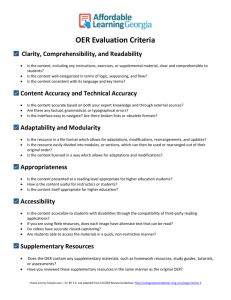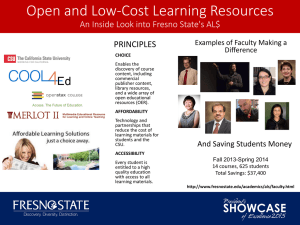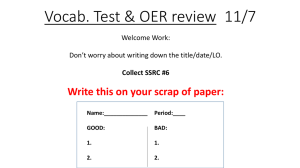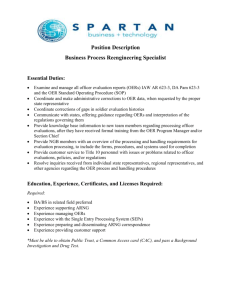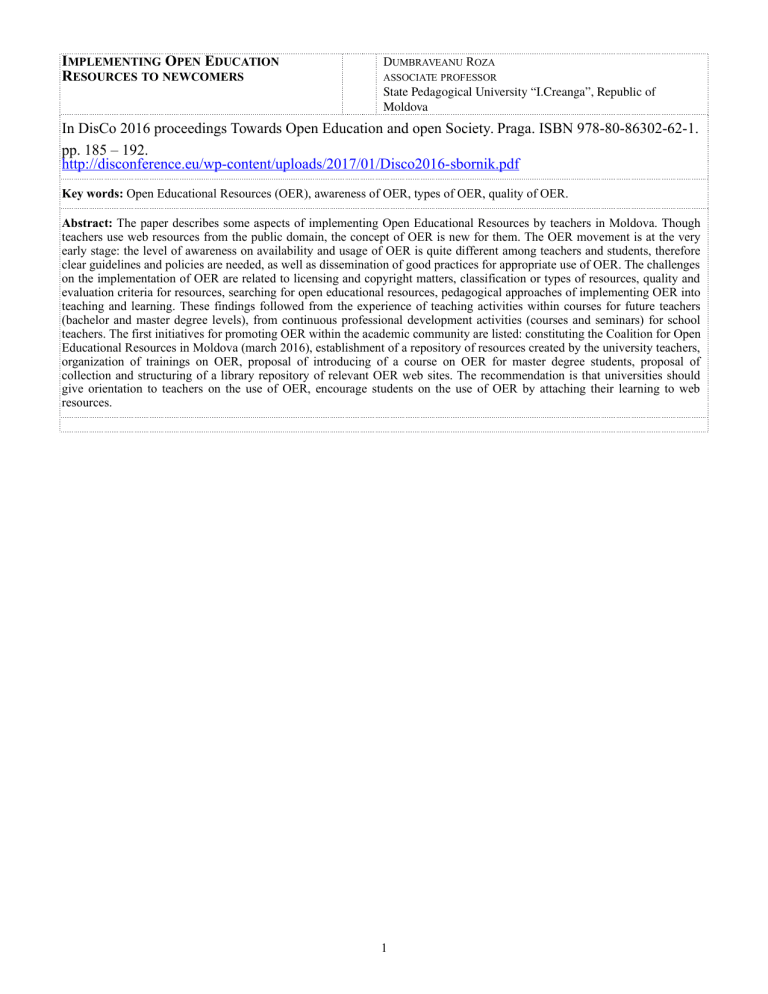
IMPLEMENTING OPEN EDUCATION RESOURCES TO NEWCOMERS DUMBRAVEANU ROZA ASSOCIATE PROFESSOR State Pedagogical University “I.Creanga”, Republic of Moldova In DisCo 2016 proceedings Towards Open Education and open Society. Praga. ISBN 978-80-86302-62-1. pp. 185 – 192. http://disconference.eu/wp-content/uploads/2017/01/Disco2016-sbornik.pdf Key words: Open Educational Resources (OER), awareness of OER, types of OER, quality of OER. Abstract: The paper describes some aspects of implementing Open Educational Resources by teachers in Moldova. Though teachers use web resources from the public domain, the concept of OER is new for them. The OER movement is at the very early stage: the level of awareness on availability and usage of OER is quite different among teachers and students, therefore clear guidelines and policies are needed, as well as dissemination of good practices for appropriate use of OER. The challenges on the implementation of OER are related to licensing and copyright matters, classification or types of resources, quality and evaluation criteria for resources, searching for open educational resources, pedagogical approaches of implementing OER into teaching and learning. These findings followed from the experience of teaching activities within courses for future teachers (bachelor and master degree levels), from continuous professional development activities (courses and seminars) for school teachers. The first initiatives for promoting OER within the academic community are listed: constituting the Coalition for Open Educational Resources in Moldova (march 2016), establishment of a repository of resources created by the university teachers, organization of trainings on OER, proposal of introducing of a course on OER for master degree students, proposal of collection and structuring of a library repository of relevant OER web sites. The recommendation is that universities should give orientation to teachers on the use of OER, encourage students on the use of OER by attaching their learning to web resources. ISSN: 1804-0527 (online) 1804-0519 (print) 1 Introduction The World Wide Web provides an immense opportunity for everyone to share, use, and reuse knowledge. With the advance of Internet connectivity, many teachers from universities and schools are incorporating web resources into their educational programmes for different reasons. This tendency, however, raises some challenges. It is critical to assure that digital materials are of high quality, relevant to the educational context and used in accordance with the intellectual property rights. Open Educational Resources (OER) are parts of these materials that comprise the essential components of education: content and tools for teaching, learning, and assessment. Though the term OER was created by UNESCO in 2002 at the forum of Open Courseware for Higher Education in Developing Countries, the level of awareness on availability and usage of OER is quite different among teachers and students from the Moldova’s educational institutions. The national policy related to the implementation of ICT into education is outlined in the Education-2020 strategy document (Strategia de Dezvoltare a Educației pentru Anii 2014-2020 „Educaţia-2020”, 2014), which includes a specific objective on the development of digital competences through the elaboration and implementation of digital educational content in the study process. The OER role is mentioned quite vaguely in the achievement of this objective with no explicit definition of the concept. The priority actions contain blurred statements related only to the use of some potentially OER (MOOC, Khan Academy). Accordingly, the policy documents and the stakeholders at the university level do not envisage activities which aim to promote OER in education. Under these circumstances the task of promoting the OER in Moldova lies on the initiatives of keen individuals. The paper is devoted to the state of the art on OER mostly at the institutional level, to the activities realised so far and to the challenges on the implementation of OER to newcomers. Awareness of OER During many years the author was involved in different formal, informal and non-formal activities related to the implementation of Information and Communication Technologies (ICT) into education. The target groups involved in these activities were teachers from universities, schools and students, future pedagogues. One of the last events was the conference Digital Resources in Education: Development and Implementation organized in December 2015 at “I. Creanga” State Pedagogical University, where the author had delivered the presentation Open Educational Resources. Through the conference discussions and conversations in other contexts with academics, the same issues and questions came up: a. What are the Open Educational Resources? b. Where to find suitable resources for the teaching & learning activities? c. Shall teachers & students trust the quality of all web resources? d. What are copyright implications of using web resources in the classroom activities? e. How can teachers protect the authorship of the developed resources? These are a few of the questions that were raised concerning digital resources in general; teachers being worried about finding and rating the quality of education materials, about the intellectual issues linked to the elaboration and delivering to the students of own or mixed resources. The concept of Open Educational Resources seemed to be a novelty to teachers and students; even they used web resources from the public domain. Interviews and discussions with the university staff and with the master degree students of the pedagogic qualification profile (the majority being school teachers) revealed frequently barriers in the implementation of OER by newcomers: inadequate level of digital competences of the staff to develop the OER; low awareness on classification of digital resources; unaided awareness of the pedagogical approach envisaged by OER to be implemented in accordance with the needs of the learners; confusion between the terms ‘open’, ‘free’, ‘no cost’, as well as between the types of licenses; doubts about the acceptance by stakeholders of OER implementation into curricula and of adequacy of OER to curricula; lack of financial support for enthusiastic developers to elaborate open educational resources; availability of OER mostly in English or French and insufficient level of language skills of teachers in order to use them. The situation is slightly different at the department of Informatics and Information Technologies in Education, to which the author belongs to. Due to the specific of the delivered courses, the teachers from this department use quite often the web resources including Open Educational Resources. The OER implemented by them into teaching are: open textbooks, tutorials, videos. Some of the department staff is involved as learners in courses delivered by Coursera portal (Coursera: The World’s Best Courses) with the threefold aim: to learn the matters, to get acquainted with the pedagogical approach of the e-courses and to get experience on the used digital learning objects. There are two courses delivered at the master level – Implementation of ICT in education and Didactics of ICT – where an attempt is made to teach students how to use the learning objects, like audio and video files, simulations, games, blogs, tutorials in teaching & learning & assessment and some themes are devoted to copyright and plagiarism issues. A small group of teachers are involved in the elaboration of their own digital resources that are incorporated in their courses in the University Learning Management System MOODLE. The potential of OER for higher education institutions is not only the use of single learning objects to be integrated into courses, but actually the possibility to adapt the content from the global resources to the needs of learners and to cover the existing gap in the quality resources (including textbooks) for the students. As for today, OER usage is more a random practice experienced by a few enthusiasts then an institutionalized one. A sustainable strategy is needed. The discussions with academics highlighted that without a pedagogic and strategic approach to promote OER, the implementation of open educational practices is not only difficult, but also not sustainable in the long term. The OER status described at „I. Creanga” State Pedagogical University is common for other Higher Education Institutions as well as for schools. In April 2016, the Educational Centre ProDidactica organised a round table devoted to the OER concept with the participation of the representatives of the Ministry of Education, Directorates for Education, members of the newly created Coalition for Open Educational Resources (13 governmental and non-governmental organisations), university and school teachers (Goras-Postica, 2016). It was stated that the OER concept is new for Moldova and it was decided to promote the relevance of OER for the education by publishing a Policy brief document and by launching a contest for open educational resources. It is expected that this contest will impact the development of OER in order to include this issue in the educational policy documents. Key Questions on OER Challenges Higher education institutions in Moldova are facing a number of challenges: globalisation, brain-drain of both teachers and students, the need to update the curriculum to make it compatible with the similar curriculum from other national and international universities, the demand to update the content due to knowledge, technological and research development. OER itself is one of these challenges, but may also be a sound strategy for individual institutions to meet them. As it was stated in the OECD report Giving Knowledge for Free, OER can be expected to affect curriculum, pedagogy and assessment. With thousands of open courses from internationally reputed higher education institutions available for free, and with the trend towards sharing learning resources, teachers will need to consider that students compare their curriculum with others and will be enforced to review and update their courses (OECD, 2007, 12). OER could be implemented in courses in different ways depending on the types of OER, educational philosophy and pedagogical approaches adopted by the teachers. As the knowledge base is changed quickly, national educational authorities (both governmental and institutional) are not able to develop quality resources such as textbooks, tutorials, literature reviews due to human and financial shortage. Open textbooks and tutorials published elsewhere are good assets to be incorporated as sources of knowledge for students and for teachers as well. Nowadays, when thousands of books can be accessed online, in physics, mathematics, chemistry, biology, programming, management, psychology etc. it is easier than ever to synthetize the course topics. With the large choice of study materials available, choosing a textbook or a tutorial can cause problems: what is the best, what suits the learners’ needs and abilities, how to make comparison as for content explanation, novelty, adequacy to learning outcomes, how to combine different styles of presenting the ideas, laws, concepts etc. Learning objects as a type of OER are perceived as providing a new strategic opportunity to improve the quality of teaching and learning process. A learning object can range from a simple digital asset, such as a piece of text or an audio file, to a more complex learning resource incorporating a range of media and designed to support a particular learning activity. New approaches and reconsiderations of didactics are required in order to effectively implement learning objects in education and to transform this process into an educational practice. Many teachers are not yet ready or skilled enough to find the best use of learning objects. Usually, learning objects are available as single units without encapsulated learning activities inherent for the achievement of course learning outcomes. Learning design should include methods, tools and resources to support teachers in implementing, in a sound pedagogical way, the technologies and learning objects into educational practice. OER are often difficult to find both for teachers and learners. Moreover, they may not be able to use them appropriately. Also, they are not able to assess whether the resources are relevant and effective. Teachers must be guided through self- development or through training on the use of different resources for education, including OER. Besides the mentioned challenges, there is a disproportion between the provision of OER by itself and of literature on OER and its utilization. The two main interrelated reasons for this are: the vast majority of OER is in English, which creates the incentives for non-English users to play the role of consumers; the academics with less developed English language skills do not access these resources. The author had made a series of web searches with the intention to explore the resources (in English and in Romanian) that could be studied to find the answers to the academics’ questions on OER. These searches identified a rich output of systematic reviews, reports, policy documents, repositories, projects, surveys, initiatives and good practices on OER in English and only a very few in Romanian, else the language issue is determinant in the promotion and use of OER, especially for users with low English language skills. Even if resources are virtually available in terms of core content, the access is limited due to language barriers. The same reason limits the capacity of academics to find contents: therefore it is important to give those hints and commencement on classifying and findability of the OER. Initiatives on promoting OER The start-up impulse on promoting OER among newcomers, including institution stakeholders, could rely on several actions: Providing links to the most relevant OER information on the institutions’ websites. Elaboration of a national website devoted to OER. Elaboration of an OER guide for academics and stakeholders in national language. Organisation of OER trainings. These initiatives are subjects of discussions and decisions of the members of the newly created Coalition for Open Educational Resources in the near future. The accomplishment of the mentioned initiatives depends on the availability of funding, that is most probable the question of applying for a project. In this section only the matters to be covered in the OER guide that should be studied in the first hand by different educational actors, especially by newcomers, are considered. These can be structured in several categories: 1. Policies for OER. 2. Definitions and their implications for the implementation of the concept of OER. 3. Classification or types of OER. 4. Quality of OER. 5. Accessibility and licenses for OER. 6. Developers of OER. 7. Repositories and search tips for OER. The topics covered in each category are interrelated, so the boundaries between these categories should not be interpreted as breakup tags. Certainly, at the development of this guide, the collected materials will be used, reused and modified in accordance with OER definition and with learners needs. In brief, the main components extracted from studied resources that should be reflected in the OER guide are seen as follows. The OER policy at the European level should be presented as guidelines for national policy. This policy is analysed in the project "Open Educational Resources Policy in Europe" that brought together a coalition of international experts, associated with Creative Commons (Creative Commons), to strengthen the implementation of open education policies across Europe. The project web site [oerpolicy.eu] reflects the current hot issues and debates on OER taking place at different events, trainings, forums that are of high interest for the stakeholders, decision makers, teachers and other users of OER. The intellectual property rights are among the first questions about OER raised by academics. Lack of awareness among academics regarding copyright law refers both to the use of existing resources and to the own developed resources. The open educational movement and the copyright issues related to content in particular, are described in many web resources. In a digital world where users are used to copy/cut and paste, remix, reuse, open content licensing is a vitally important issue for developing a culture of sharing and reshaping knowledge as a professional ethics, especially in education. Open content licensing of digital resources is governed by the Creative Commons project, which describes different kinds of licences that may be linked to the each open educational resource. Creative Commons’ licenses provide a way to permit controlled sharing of developed resources that is the most spread expression of the academics concerning their work. The scope of Creative Commons’ licences, the barriers encountered in promoting intellectual policy, the role of different stakeholders, the practical assistance to institutions developing or intending to use and distribute open educational resources are to be described in the guide. A concise but exhaustive overview of quality issues related to OER prepared by the European Foundation for Quality in e-Learning (EFQUEL) and presented in the report State of the Art Review of Quality Issues related to Open Educational Resources (OER) is of great value for newcomers. The report devoted mainly to the quality assurance approaches of OER had demonstrated the complexity of the subject and had pointed out that the quality processes should involve two networks of users: the ‘open’ network of users, reviewers and teachers working together for quality improvement of resources, teaching and learning and the existing network in the publishing industry and in formal education. The report had mapped the role of different stakeholders (15 categories) in the process of the lifecycle of OER in the quality approaches. A brief and explicit analysis of the OER definitions and their meanings as well as of the types of OER is made also in this report. The OER definitions share some universal commonalities having at the same time differences. The common features relate to the use and reuse, repurpose, and modification of the resources; to the free use for educational purposes by teachers and learners; to the types of digital media. The differences concern the nature (digital or non-digital) of the resources, the level of openness, the source of resource (either explicit educational or any with potential for learning). A comprehensive hierarchical classification of OER types, based on literature research, is made in the mentioned report. The partition of different kinds of OER, together with examples of specific resources under the three categories – learning content, tools, implementation resources –- should be compulsorily presented in the guide for the newcomers‘ better understanding of OER types. There are different search facilities allowing academics and learners to find relevant OER. Nonetheless, these tools are little known and should be characterised in the user guide. The search facilities include open educational networks, special search engines, database clouds, open educational tools, OER projects’ portals, and OER full courses/programmes. The author is very supportive of the idea of implementing Open Educational Resources into study programmes. The intention is to elaborate two course syllabuses: for master degree students and for continuous professional development of teachers. The initiative seeks to boost the academics interest in the process of discovery of valuable OER movement, by engaging faculty in the redesign of courses and degree programs through the replacement of proprietary textbooks and enrichment of study materials with open educational resources. There is the hope that over the next years, the Open Educational Resources movement will lay the groundwork for national adoption of OER Degrees. Conclusion The paper presents an attempt to describe the state of the art of emerging OER initiatives in the education space of Moldova. The awareness of OER among academics is at early stages and serious efforts are required to promote and implement the OER to the advanced stage of open educational practice. The existing initiatives are quite modest, rather bottom up, versus top down, individual driven versus institutional structured. Nonetheless, the international practices and the country educational needs prove that there is a growing necessity for all education institutions and policy stakeholders to get engaged in the OER movement. References Alquézar Sabadie, J.M., Castaño Muñoz, J., Punie, Y., Redecker, C., Vuorikari, R., 2014, OER: An European Policy Perspectives, http://jime.open.ac.uk/articles/10.5334/2014-05/, accessed on 11th of November 2015. Amiel, T., 2013, “Identifying Barriers to the Remix of Translated Open Educational Resources”, The International Review of Research in Open and Distance Learning, Vol. 14, pp. 126-144. http://www.irrodl.org/index.php/irrodl/article/viewFile/1351/2448, accessed on 17th of February 2016. Atkins, D., Brown, J., Hammond, A., 2007. A Review of the Open Educational Resources (OER) Movement: Achievements, Challenges, and New Opportunities, http://www.hewlett.org/uploads/files/ ReviewoftheOERMovement.pdf, accessed on 30th of March, 2016. UNESCO and Commonwealth of Learning, 2011, 2015. Guidelines for Open Educational Resources (OER) in Higher Education, http://unesdoc.unesco.org/images/0021/002136/213605e.pdf, accessed on 25th of February, 2016. Bates, T., 2001, National strategies for e-learning in post-secondary education and training, http://unesdoc.unesco.org/images/0012/001262/126230e.pdf, accessed on 16th of October, 2014. Butcher, N., 2011, 2015, A Basic Guide to Open Educational Resources (OER), http://unesdoc.unesco.org/images/0021/002158/215804e.pdf, accessed on 19th of January, 2016. Camilleri, A., Ehlers, U., Pawlowski, J., 2014, State of the Art Review of Quality Issues related to Open Educational Resources (OER). http://is.jrc.ec.europa.eu/pages/EAP/documents/201405JRC88304.pdf, accessed on 16th of December, 2015. Coursera: The World’s Best Courses, Online, https://www.coursera.org/ accessed 25th of March, 2016. Creative Commons. https://creativecommons.org/, accessed on 30th of May, 2014. Falconer, I., McGill, L., Littlejohn, A., Boursinou, E., 2013. Overview and Analysis of Practices with Open Educational Resources in Adult Education in Europe, http://ftp.jrc.es/EURdoc/JRC85471.pdf, accessed on 27th January, 2016. Find OER. “Open Professional Education Network”, https://open4us.org/find-oer/, accessed on 16th of February, 2016. Goras-Postica, V., 2016, Educatia Deschisa in Moldova: Aici si http://www.prodidactica.md/news/263.php3, accessed on 29th of April, 2016. OECD, 2007. „Giving Knowledge for Free. The Emergence of Open Educational Resources“, Acum, https://www.oecd.org/edu/ceri/38654317.pdf, accessed on 30th November, 2015. OER projects, “Open Educational Resources at The Open University”, http://www.open.ac.uk/about/open-educational-resources/projects, accessed on 27th of January, 2016. OER knowledge cloud. https://oerknowledgecloud.org/lang_page/welcome, accessed on 26th of January, 2016. Online courses. https://www.futurelearn.com/courses, accessed on 29th of January, 2016. Open Education Information Center. “Open Education Consortium”, http://www.oeconsortium.org/infocenter/, accessed on 9th of March, 2016. Open Educational Ideas. http://project.idea-space.eu/, accessed on 17th of March, 2016. Open Learn. The home of free learning from The Open University since 2006. http://www.open.edu/openlearn/, accessed on 16th of March, 2016. Projects & Resources. http://www.openeducationweek.org/resources, accessed on 14th of April, 2016. Strategia de Dezvoltare a Educației pentru Anii 2014-2020 „Educaţia-2020”, 2014, Monitorul Oficial din 21.11.2014. Voicu, O., 2014, Resurse Educationale Deschise: Oportunitati pentru Romania, http://www.fundatia.ro/ sites/default/files/RED%20-%20oportunitati%20pentru%20Romania.pdf, accessed on 24th of February, 2016. 80 Open Education Resource (OER) Tools for Publishing and Development Initiatives, 2013, Open Education Database, http://oedb.org/ilibrarian/80-oer-tools/, accesses on 28th of January, 2016.
